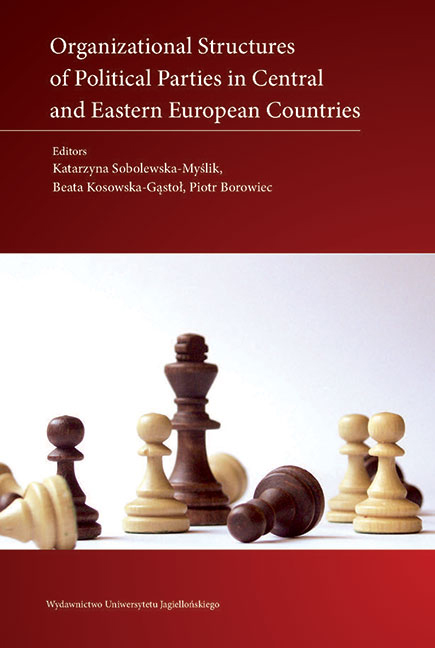Book contents
- Frontmatter
- Contents
- Preface
- Developing Party Structures in Central and Eastern Europe
- Albania: Organizations of Political Parties in Albania
- Belarus: Belarusian Political Parties: Organizational Structures and Practices
- Bosnia and Herzegovina: Organizational Structures of Political Parties in CEE Countries: A Case Study on Bosnia and Herzegovina
- Bulgaria: Organizational Structure and Trends in Bulgarian Party Politics
- Croatia: Organizational Structures of Political Parties in Croatia
- Czech Republic: Between Organizational Extremes: Czech Parties after a Political Earthquake
- Estonia: Organizational Structures of Political Parties in Estonia
- Hungary: Cut from the Same Cloth? A Comparative Analysis of Party Organizations in Hungary
- Kosovo: Structure of the Main Political Parties in Kosovo
- Latvia: Leader-Centered and Power-Hungry: Party Organizations in Latvia
- Lithuania: Organization of Political Parties: The Case of Lithuania
- Moldova: Organizational Structures of Political Parties in The Republic of Moldova
- Montenegro: Party Organization in Montenegro: Structural Resemblance Behind Political Divergence
- Poland: Structures of Polish Political Parties in the Second Decade of the 21st Century
- Romania: The Internal Organization of Romanian Political Parties
- Russia: Parties with Roots Growing Upwards: Organizational Features of Russian Political Parties
- Serbia: Organizational Structures of Political Parties in Serbia
- Slovakia: Organizational Structures of Political Parties in Slovakia: Parties not for Members
- Slovenia: Almost without Any Innovations: Organizational Structures in Slovenian Parties
- Ukraine: Shallow Party Structures in a Volatile Party System
- Comparing Organizational Structures of Political Parties in Central and Eastern European Countries
- Biographical notes about the authors
Slovenia: Almost without Any Innovations: Organizational Structures in Slovenian Parties
- Frontmatter
- Contents
- Preface
- Developing Party Structures in Central and Eastern Europe
- Albania: Organizations of Political Parties in Albania
- Belarus: Belarusian Political Parties: Organizational Structures and Practices
- Bosnia and Herzegovina: Organizational Structures of Political Parties in CEE Countries: A Case Study on Bosnia and Herzegovina
- Bulgaria: Organizational Structure and Trends in Bulgarian Party Politics
- Croatia: Organizational Structures of Political Parties in Croatia
- Czech Republic: Between Organizational Extremes: Czech Parties after a Political Earthquake
- Estonia: Organizational Structures of Political Parties in Estonia
- Hungary: Cut from the Same Cloth? A Comparative Analysis of Party Organizations in Hungary
- Kosovo: Structure of the Main Political Parties in Kosovo
- Latvia: Leader-Centered and Power-Hungry: Party Organizations in Latvia
- Lithuania: Organization of Political Parties: The Case of Lithuania
- Moldova: Organizational Structures of Political Parties in The Republic of Moldova
- Montenegro: Party Organization in Montenegro: Structural Resemblance Behind Political Divergence
- Poland: Structures of Polish Political Parties in the Second Decade of the 21st Century
- Romania: The Internal Organization of Romanian Political Parties
- Russia: Parties with Roots Growing Upwards: Organizational Features of Russian Political Parties
- Serbia: Organizational Structures of Political Parties in Serbia
- Slovakia: Organizational Structures of Political Parties in Slovakia: Parties not for Members
- Slovenia: Almost without Any Innovations: Organizational Structures in Slovenian Parties
- Ukraine: Shallow Party Structures in a Volatile Party System
- Comparing Organizational Structures of Political Parties in Central and Eastern European Countries
- Biographical notes about the authors
Summary
Introduction
As has been exposed by many political scientists, all political parties must develop their organization, whether they want to thrive actively or simply survive in the long-term. The dual aim of this article is to present the organizational structures of Slovenian parties, and to reveal and explain any differences between them. Parties can be distinguished in terms of their age, size, model of development, and ideological position. All these characteristics will be used to analyze how Slovenian parties differ in their organizational structures.
This article is based on analysis of formal documents (party statutes). In this study, we restrict ourselves to an investigation only of current parliamentary parties in Slovenia. The article is organized into several sections, the first of which deals with the development and regulation of parties, followed by a presentation of the main characteristics of the Slovenian party system and its parties. The last two sections present characteristics of organizational structures in parties, as well as intra-party processes.
Development and Regulation of Parties
By the 1890s, party life in Slovenia was already well-developed, with three parties representing the main political orientations: conservative; liberal; and social democratic. This initial period of party development was followed by the development of parties except for the League of Communists were prohibited.
In 1991, Slovenia adopted a new Constitution. Although the Constitution, like in many other countries, acknowledges the existence of political parties (van Biezen and Borz 2012), these are mentioned only a few times, mainly in the form of a prohibition – for example, professionals in the Slovenian Army as well as police officers are not allowed to be members of political parties. Likewise, the function of a judge is incompatible with membership in party bodies (Lukšič 1994). On the other hand, as a rule, party laws to a greater extent regulate parties, including their operation and functioning (van Biezen and Piccio 2013).
In fact, a previous law dealing with political parties was adopted in Slovenia in December 1989. Although this was a short document with only 27 articles, it mentioned several of the more common areas of party regulation (Karvonen 2007).
- Type
- Chapter
- Information
- Organizational Structures of Political Parties in Central and Eastern European Countries , pp. 419 - 440Publisher: Jagiellonian University PressPrint publication year: 2017



